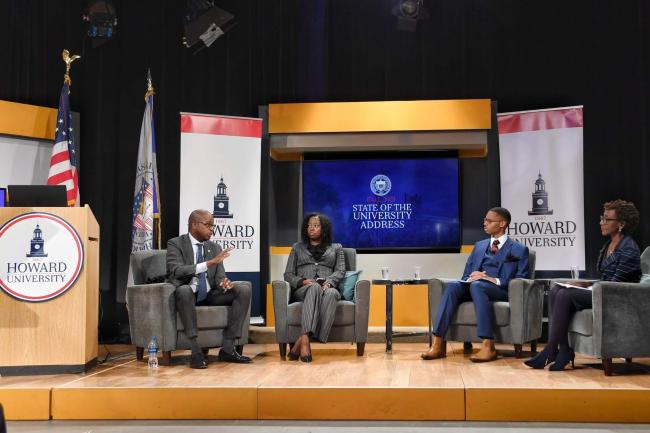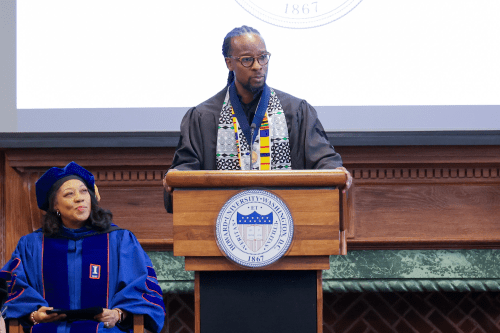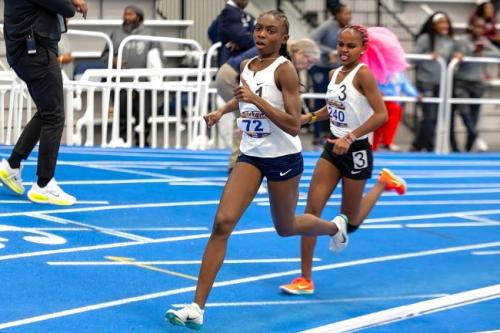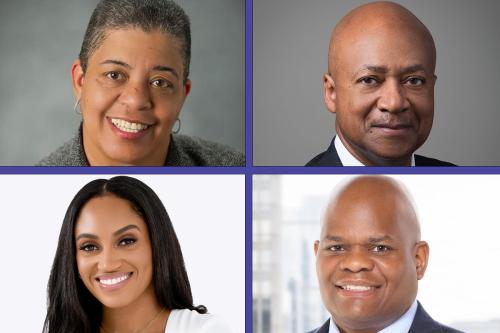WASHINGTON – Howard University President Wayne A. I. Frederick discussed ongoing initiatives to reinforce maintenance and preventative care measures in campus housing. As a part of the State of the University Address, Dr. Frederick also participated in a live question-and-answer session with students, staff members and alumni to address the student demonstration on campus.
“We want to assure our students that they have our undivided attention and we will hold our campus housing providers accountable to ensure their living accommodations are always exceeding residents’ expectations,” Dr. Frederick said on Friday. “This effort involves nearly every unit in the University.”
This fall, amidst student complaints, the University identified 41 dormitory rooms affected by mold, less than 1 percent of the total rooms on campus. Howard offered all affected students opportunities to be relocated and implemented the "hyper care" strategy – a administrative initiative meant to ensure student living accommodations are safe and healthy.
“If this happens once, as I said before, it’s not acceptable,” Dr. Frederick said in response to questions. “The reality is not having anybody occupying the residence halls for a year increased the chance of having mold appear. We had a long, wet and hot summer, and that has extended into the fall, and so these are issues that we have had to mitigate.”
Dr. Frederick was joined on stage by an invited panel for a question-and-answer period, which included an undergraduate, a law student and an alumna. An audience of about 26 people, made up of students, staff, faculty, staff and deans, also participated in the questioning period.
Asked why he hadn’t met with protesters, Dr. Frederick said:
“Actually, I have met with the students. The protest began October 12; I met with them on October 14. I’ve also made overtures to them as recently as last night about being willing to sit down and have a conversation. I don’t have any apprehension about meeting with them. The takeover at Blackburn was at the tail end of a series of smaller protests. My team engaged with the protesters during that period of time. I also don’t want to engage in a public back and forth with the protestors. I don’t want to create a counter narrative on social media. I would much rather sit down and have a conversation.” Watch the full response here.
Asked why the student, faculty and alumni affiliate positions on the Board of Trustees removed, Dr. Frederick responded:
“The board decided to go with a structure that would still have shared governance but would be deployed differently. One new mechanism is for the student, alumni and faculty representatives to participate as voting members on the board at a committee level. The second mechanism is to revitalize the board of visitors for every school and college, including student and faculty representation. There will also be listening sessions by the board for different members of the community to participate in. My advice is to give the restructure an opportunity, see how it works and provide feedback.”
In response to students’ concerns, Dr. Frederick shared with the Howard community that all eight campus dormitories had been placed in “hyper care.” Under the initiative, multiple vendors, additional staff, and resources are being dedicated to each residence hall. The activity has meant increased frequencies of microbial wipe downs, filter changes, general cleanings, HVAC assessment and more. The initiative will also include what Dr. Frederick called an amplified communication response – more residential hall meetings, parent forums, and email communications to keep residents current with information. The University has also boosted air sampling, moisture tests, visual inspections, documentation and research into problems.
Administrators also established HUcares@Howard.edu, an email address where student residents can contact a senior administration official if they have an ongoing maintenance need that has not been addressed. Even so, Dr. Frederick pointed out that new construction activity on campus in recent years has brought significantly improved infrastructure on campus. In the past five years, the Office of Residence Life and University Housing has completely rebuilt or renovated seven of the eight University residence halls.
“Where we have to do more is in preventative maintenance, avoiding trouble when issues do occur and responding to them quickly so that residents are not inconvenienced for any length of time; and I absolutely take full responsibility for that,” Dr. Frederick said. “I think that’s one of the areas that we’ve fallen short on and one of the areas that we certainly intend to improve.”
In August, Howard University welcomed back the largest contingent of students since the onset of the pandemic. Enrollment climbed to 12,000 students. Howard houses 64 percent of its undergraduates, the third-highest rate in the District of Columbia. To accommodate students’ housing needs, the University made available 5,714 beds in the fall – a 15 percent increase. In addition, the University secured additional student bed space through leasing agreements with off-campus properties.
Dr. Frederick also addressed housing insecurity, which he said has been exacerbated by gentrification in the city. He said residential housing at Howard University is currently at 94 percent occupancy – meaning about 200 beds are vacant. He urged any student experiencing housing insecurity to speak with staff in the Office of Student Affairs.
Dr. Frederick said the new measures would ensure administrators responded more quickly to maintenance issues, and he pledged more dialogue with students.
“I want to be absolutely clear about my commitment,” Dr. Frederick said. “We’re continuing to build a University that can stand on its own today and in the future. That is a process that takes time.”
###
About Howard University
Founded in 1867, Howard University is a private, research university that is comprised of 14 schools and colleges. Students pursue more than 140 programs of study leading to undergraduate, graduate and professional degrees. The University operates with a commitment to Excellence in Truth and Service and has produced one Schwarzman Scholar, three Marshall Scholars, four Rhodes Scholars, 12 Truman Scholars, 25 Pickering Fellows and more than 165 Fulbright recipients. Howard also produces more on-campus African American Ph.D. recipients than any other university in the United States. For more information on Howard University, visit www.howard.edu.





